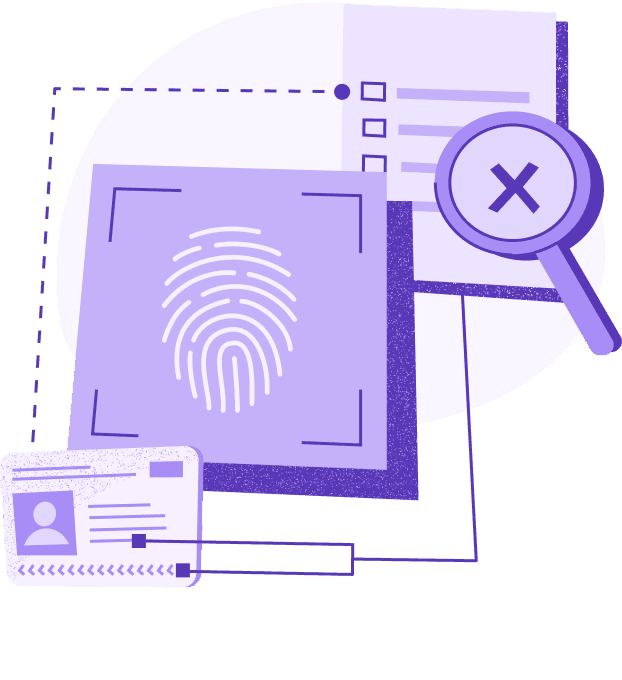Article
5 min read
A Guide to Employee Background Checks in the United States
Employee background checks

Author
Michał Kowalewski
Last Update
April 14, 2025

Table of Contents
What employers need to know before running background checks in the United States
Are background checks legal in the United States?
What types of background checks are illegal in the United States?
Common background check industries in the United States
Types of employee background checks in the United States
Background check mistakes to avoid in the United States
Step-by-step guide to employee background checks in the United States
Run employee background checks with Deel
Key takeaways
- Background checks in the US must comply with the Fair Credit Reporting Act (FCRA), requiring explicit consent from candidates and proper disclosure
- Violating FCRA or anti-discrimination laws can lead to severe penalties, including fines and lawsuits. Employers must avoid using protected characteristics or medical information
- Common types include criminal records, employment verification, qualifications, and increasingly, social media screenings and drug tests for certain roles
Employee background checks should be an integral part of your hiring process in the United States. Although not mandatory, they are a common practice, especially in finance, healthcare, education, security, law enforcement, and the public sector.
The United States is one of the largest tech employers in the world, with approximately 9.9 million workers in the tech sector as of 2024, representing a 3.1% increase from the previous year. The tech workforce is expected to grow at twice the rate of the overall U.S. workforce over the next decade. The high demand for tech talent, including roles in software development, data science, and cybersecurity, highlights the U.S. as a hub for hiring top-tier professionals. The country offers a compelling mix of innovation and high-quality output, with minimal cultural barriers and excellent communication skills due to high English proficiency.
When hiring in the United States, it's crucial to be mindful of local employment laws, particularly regarding background checks. This highlights the importance of a thorough understanding of local practices to ensure a smooth and compliant recruitment process.
In this article, you’ll learn:
- How to run an effective and legal employment screening in the United States
- What are the common types of employee checks in the United States
- Step-by-step process of a thorough employee screening
- What mistakes to avoid when performing a background check in the United States
What employers need to know before running background checks in the United States
An employee background check is the process of verifying a potential hire’s work history, education, professional qualifications, and any criminal records they might have. It’s particularly beneficial to run before finalizing an employment offer or signing a contract, ensuring the candidate meets the company's standards and requirements.
In the United States, employee background checks are governed by the Fair Credit Reporting Act (FCRA) and enforced by the Federal Trade Commission (FTC) and the Consumer Financial Protection Bureau (CFPB).
- FCRA: This federal law regulates the collection, dissemination, and use of consumer information, including background checks. The FCRA requires employers to obtain explicit consent from individuals before conducting a background check and to provide them with specific disclosures and notices. It emphasizes the need for accuracy, relevance, and transparency in data processing.
- FTC and CFPB: These agencies are responsible for enforcing the FCRA. The FTC oversees compliance with fair trade practices, including the proper handling of consumer reports, while the CFPB focuses on protecting consumers in the financial sector. Both agencies have the authority to take enforcement actions against companies that violate FCRA regulations, which can include fines and other penalties.
Unique cultural and legal considerations in the United States include a strong emphasis on anti-discrimination laws and privacy rights. U.S. culture values individual privacy, and there are stringent regulations against using protected characteristics (such as race, gender, and religion) in hiring decisions.
Are background checks legal in the United States?
Yes, background checks are legal in the United States, but they must be conducted in compliance with the FCRA and other relevant laws. Employers are required to obtain written consent from the candidate before initiating a background check and must provide a copy of the report if the information in the report leads to an adverse employment decision.
Specific regulations and restrictions that recruiters need to be aware of include the prohibition of using arrest records that did not result in conviction as the sole basis for employment decisions, as it may disproportionately impact certain groups protected under the EEOC guidelines. Additionally, some states have "ban the box" laws that restrict employers from inquiring about criminal history on job applications.
Background checks
What types of background checks are illegal in the United States?
In the United States, employers must be mindful of various laws when conducting background checks to avoid illegal practices.
Stay clear of:
- Using protected characteristics: Conducting background checks that use information on protected characteristics, such as race, gender, religion, or national origin, to make hiring decisions is prohibited under anti-discrimination laws, including Title VII of the Civil Rights Act.
- Medical records and genetic information: Using medical records or genetic information for hiring decisions is illegal under the Americans with Disabilities Act (ADA) and the Genetic Information Nondiscrimination Act (GINA). Employers cannot request or use such information during the hiring process.
- Non-consensual verifications: Conducting any type of background check, such as credit checks or criminal background checks, without the candidate's explicit consent is prohibited. Consent must be obtained in writing as per the Fair Credit Reporting Act (FCRA).
- Blanket policies on criminal records: Using blanket policies that automatically disqualify candidates with criminal records can lead to disparate impact and potential discrimination claims. Employers should consider the nature of the offense, its relevance to the job, and the time that has passed since the conviction, in accordance with Equal Employment Opportunity Commission (EEOC) guidelines.
Violating data privacy laws during employee background checks in the United States can lead to significant legal repercussions due to strict adherence to the FCRA, ADA, GINA, and other relevant regulations.
Specifically, the FCRA outlines penalties for non-compliance, which include:
- Civil penalties: Employers can face civil lawsuits from candidates and may be required to pay actual damages, statutory damages ranging from $100 to $1,000 per violation, punitive damages, and legal fees.
- Federal Trade Commission (FTC) fines: The FTC enforces the FCRA and can impose fines on employers for non-compliance. For example, in 2015, the FTC fined two companies, including General Information Services and e-Backgroundchecks.com, a total of $13 million for FCRA violations
- EEOC fines and penalties: The EEOC can impose penalties for discriminatory practices related to background checks. For example, in 2013, BMW Manufacturing Co., LLC, paid $1.6 million to settle an EEOC lawsuit alleging that its criminal background check policy disproportionately excluded African American applicants.
Common background check industries in the United States
In the United States, various industries rely on employee background checks to ensure the integrity and reliability of their workforce. Some of the common industries where background checks are prevalent include:
-
Financial services: Due to the nature of handling sensitive financial information, the financial services industry conducts thorough background checks to assess the integrity and trustworthiness of potential employees. This helps prevent fraud, embezzlement, and other financial crimes, ensuring compliance with regulatory standards.
-
Healthcare: Healthcare organizations prioritize patient safety and confidentiality, leading to extensive background checks to ensure the qualifications and ethical conduct of healthcare professionals. This is crucial for maintaining high standards of care and safeguarding patient information.
-
Education: Educational institutions conduct background checks to verify the credentials and suitability of teaching staff, especially for positions involving interactions with children and young adults. These checks help protect students and maintain a safe learning environment.
-
Government and public sector: Given the public trust associated with government roles, background checks are standard practice to assess the integrity and reliability of candidates. This helps ensure that employees in these positions uphold the highest ethical standards and security requirements.
-
Security and law enforcement: Background checks are crucial in the security and law enforcement sector to evaluate the character and suitability of individuals entrusted with public safety responsibilities. These checks help maintain public trust and ensure that personnel are fit for their roles in protecting the community.
Types of employee background checks in the United States
Effective employment screening in the United States covers essential aspects to evaluate a candidate's abilities. Knowing these areas helps employers tailor screening processes to meet job requirements and legal standards.
| Type of Check | Common in United States | Reason |
|---|---|---|
| Criminal record check | Common | This is a routine part of the hiring process, especially in roles involving security, trust, or vulnerable populations |
| Employment history verification | Common | Important for confirming a candidate's work history, helping to prevent resume fraud and ensure they have relevant experience |
| Qualification verification | Common | Ensures that the educational and certification claims made by a candidate are legitimate and meet job requirements |
| Credit history check | Less common | Particularly relevant for roles in finance, banking, and other positions of trust, helping employers gauge financial responsibility |
| Social media screening | Increasingly common | Growing in popularity as employers seek to understand more about a candidate's character and potential cultural fit within the company |
| Drug testing | Common | Essential for roles that require a high degree of safety and compliance, helping to mitigate risks associated with substance abuse |
Background check mistakes to avoid in the United States
Whether you’re hiring employees or contractors in United States, there are a few things you shouldn’t do as an employer when it comes to background checks:
- Neglecting FCRA compliance: Failure to comply with the FCRA's requirements, such as providing proper disclosures and obtaining consent, can lead to legal repercussions and lawsuits.
- Using outdated information: Relying on outdated background check information can result in hiring decisions based on inaccurate data, potentially leading to unfair treatment of candidates.
- Disregarding ban the box laws: Ignoring "ban the box" laws that restrict inquiries about criminal history on job applications can result in legal liabilities and discrimination claims.
- Overlooking individualized assessments: Failing to conduct individualized assessments of candidates with criminal records, as recommended by the EEOC, can lead to disparate impact and potential discrimination claims.
- Failing to notify candidates: Not providing candidates with pre-adverse action and adverse action notices, along with a copy of the background check report and a summary of rights, can violate the FCRA and lead to legal consequences.
Step-by-step guide to employee background checks in the United States
Employers looking to hire in the United States should follow the list of steps below to ensure legal and effective and thorough employee background checks.
-
Obtain written consent: Before initiating a background check, employers must obtain written consent from the candidate.
-
Choose a consumer reporting agency (CRA): Select a reputable CRA to conduct the background check. Ensure that the CRA complies with the FCRA and provides accurate and up-to-date information.
-
Provide disclosure: Provide candidates with a clear and conspicuous disclosure that a background check will be conducted and that they have the right to review the report.
-
Review state laws: Be aware of state-specific laws and regulations, as some states have additional requirements for background checks.
-
Conduct the background check: The background check may include criminal records, credit history (if relevant to the job), employment history, education verification, and reference checks.
-
Adverse action process: If the information in the background check leads to an adverse employment decision, such as not hiring the candidate, the employer must provide a pre-adverse action notice, a copy of the report, and a summary of rights under the FCRA to the candidate.
-
Allow for dispute: If the candidate disputes the information in the report, the employer should allow them to correct any inaccuracies with the CRA.
-
Final adverse action: After waiting a reasonable period, the employer can take final adverse action if the candidate has not successfully disputed the information.
-
Maintain compliance: Employers must ensure ongoing compliance with the FCRA and other relevant laws, including proper record-keeping and disposal of background check information.
-
Respect privacy: Throughout the process, respect the privacy of the candidates and handle their personal information with care and confidentiality.
You can also automate this process using Deel, and get a fast employee background check, with results coming in a matter of minutes.
Many of our processes and compliance certifications require that we conduct background checks on all full-time consultants and employees of the company. Deel makes this easy as the background check is a seamless add-on during the onboarding process. It's quick, there's no duplication of information, and the report is saved within the team member's profile for easy reference in the future.
—Audrey McNicholas,
Head of Business Operations at Condor
Run employee background checks with Deel
There’s no need for HR to log into yet another platform or manually chase documents. With screenings in over 200 countries and territories (and counting), you can manage background checks for global employees and contractors with a single source of truth without leaving the Deel platform.
Start running fast background checks with Deel—request a demo today.

About the author
Michał Kowalewski a writer and content manager with 7+ years of experience in digital marketing. He spent most of his professional career working in startups and tech industry. He's a big proponent of remote work considering it not just a professional preference but a lifestyle that enhances productivity and fosters a flexible work environment. He enjoys tackling topics of venture capital, equity, and startup finance.
















